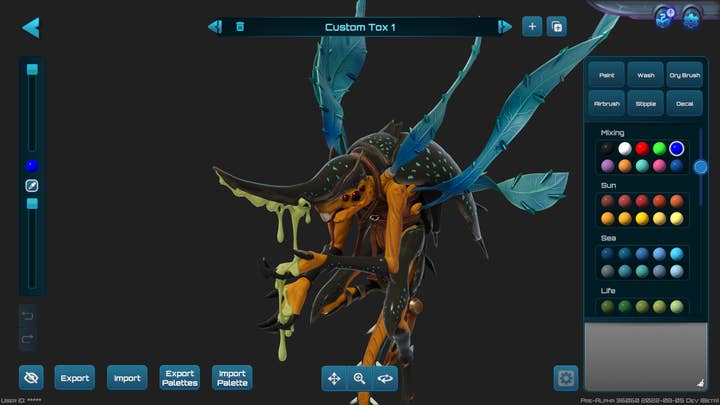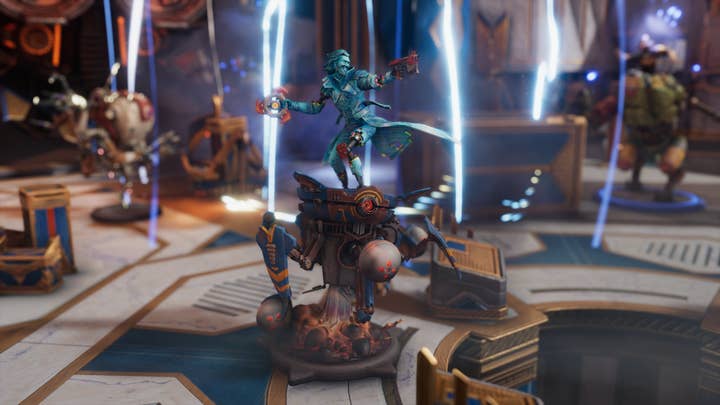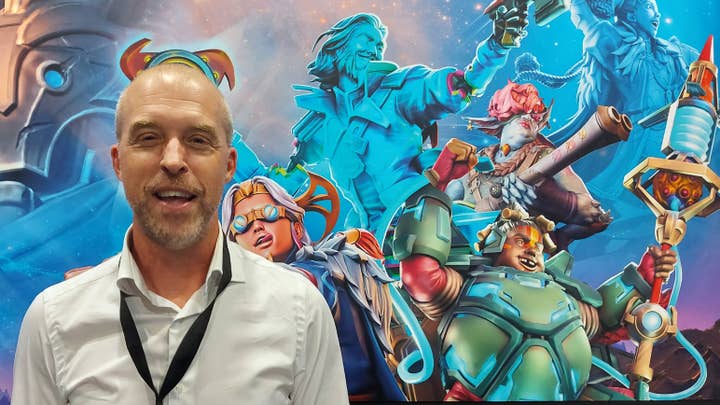Unknown Worlds' Moonbreaker: Canterbury Tales, miniatures, audio dramas and a best-selling author
The Subnautica studio shares more about its first live-service game and the ambitious narrative behind it
Among the sea of sci-fi survival horror shooter 'you're going to die… in space' type games at Gamescom Opening Night Live, there were a handful of more original ideas. One such title that generated no small amount of interest was Moonbreaker, the next new IP from Subnautica developer Unknown Worlds.
Two days after its debut, we sat down with the game's director and studio co-founder Charlie Cleveland (pictured above) to discuss the dramatic shifts this represents for the company. For one thing, it's yet another change of genre.
Unknown Worlds began as the team behind Natural Selection, a Half-Life mod that mixed first-person shooter and real-time strategy elements. Since then, the studio has produced games ranging from relaxing puzzle game Zen of Sudoku to first-person survival and exploration outing Subnautica.
"We were the only game at Gamescom that looks anything like this. If we animated, all of a sudden we fit in with all the other stuff"
Meanwhile, Moonbreaker – which launches in Early Access today – is a turn-based strategy title where all your units are miniatures, the likes of which you would most typically see in a tabletop gaming shop. Most studios hone their craft in a particular area, so why does Unknown Worlds keep switching genres?
"I think I would just be bored," Cleveland tells GamesIndustry.biz. "Our first game took ten years to make. I never wanted to work on another game like that ever again. Our second game, Subnautica, took five years – we wanted to try something new. For me to stay pumped and excited and happy, I want to work on new stuff. My business partner Max is the same way. He's Mr. Technical, he runs everything technical at the studio. He doesn't want to work on the same thing. Even five years is too long for him. He wants to be pushing harder and faster on new stuff. It's really that simple."
Fair enough, although this flies in the face of the business model the studio has chosen for Moonbreaker. The game is not just the team's first strategy game, it's also their first live-service game, a long-tail offering designed to be constantly updated for years.
"I know, why did we do this?" Cleveland laughs. "I realised that like a year ago, 'What did I get myself into?' We'll figure it out. I'm super passionate about this game. I've been dreaming about this game for years at this point, just obsessed. I'll just play it after work repeatedly, even against the AI when there's no players, I'm just going to play."
The miniatures aspect has been key to the project from day one – "We'd just cancel if we weren't making a miniatures game," says Cleveland – and the team has spent several years balancing how much they bring Moonbreaker's figures to life. It's not quite as animated as the Millennium Falcon's weird chess-with-monsters game, but far less rigid than Hitman Go.
"[Having digital painting] was like a five-minute conversation and it was like '… How has no-one done this?'"
"This was a hard one to really nail down. We started with miniatures and we knew we wanted to make a fantastic digital game. We tried a bunch of different things; animating the miniatures kept breaking the miniatures' feel – especially paint your miniature and you see it moving, it didn't feel miniature to us. It's better to lean into miniatures, it's a very unique visual style. We were the only game at Gamescom that looks anything like this. If we animated, all of a sudden we fit in with all the other stuff."
The painting is another aspect that got folks talking around the reveal; Moonbreaker has a full digital painting mode where you can intricately colour in your creatures and captains to your liking. It seems like such an obvious fit for a miniatures game, it's hard to work out why long-running tabletop brands – looking at you, Warhammer – haven't done something like this before.
"Games Workshop has a lot to lose if they go digital," Cleveland observes. "They're invested in physical, they have thousands of employees working in factories with hundreds of stores. But I am very surprised that no-one else has made a digital miniatures game.
"I remember the moment we were casually discussing 'Oh, a digital miniatures game? That'd be cool.' 'Oh yeah, we wouldn't have to animate the units because they'd be miniatures.' 'Oh, that'd be cool, we could have a painting tool.' It was like a five-minute conversation and it was like '… How has no-one done this?'
"We prototyped this and for five years I've been trying to convince other people that this is going to be awesome. Now finally the game looks good; it did not look good. It wasn't very long ago that this game did not look very good. It wouldn't have inspired confidence."
(It's perhaps prophetic that we discussed how video games "generally look awful until the last few months," as Cleveland puts it. The recent Grand Theft Auto 6 leak revealed misconceptions among consumers that graphics are handled first, something developers have responded to with examples of in-progress stills and videos from acclaimed titles. With Moonbreaker, Cleveland says visual effects "came in very late" and just one year ago the game did not have any character art.)

There's another key aspect to Moonbreaker's appeal; as revealed at Gamescom, the title has been developed in collaboration with Brandon Sanderson, the best-selling author behind the Mistborn series and the last three books in Robert Jordan's long-running Wheel of Time series. Quite the get for an indie studio, so how did this partnership come about?
"We knew we wanted to make a very appealing universe. We've done that with Subnautica, that was great, but we wanted to make something that's going to last decades, something like Magic or Yu-Gi-Oh or League of Legends, something that's a big, long-term property."
"We wanted to make something that's going to last decades, something like Magic or Yu-Gi-Oh or League of Legends"
Unknown Worlds approached Bad Robot Games – yes, JJ Abrams' Bad Robot – who helped them search for a writer. The Subnautica developer interviewed several, but Cleveland says Sanderson was "immediately our person." Already a gamer (and a fan of Subnautica, it turns out), the author has spent the past three years building the lore and the world of Moonbreaker.
"He's not checking out daily builds or giving feedback on the UI – he's a very busy guy," Cleveland clarifies. "For years, we would meet with him every week, we'd talk about the latest captains and cultures and all the different ideas he had. We'd go through them with a fine-tooth comb and say what was going to work for the game and what wasn't, or whether we could change a particular character because we had this gameplay idea. He'd show us the cool new stuff, we read it the night before, got all excited, have all these questions and we talk about it. There's a lot more to it than that."
Sanderson essentially gave Unknown Worlds what Cleveland describes as a "world bible," containing everything the team needs to know about the creatures, people, cultures, and worlds – even holidays and weather patterns. The author also created the concepts for each of the captains, as well as their backstories, narrative arcs and how the latter weave together.
The captains are not only central to the gameplay, but also the root of the storyline's structure. Cleveland describes Moonbreaker as "The Canterbury Tales in space," a concept that has been in place since the beginning; as with Chaucer's works, each chapter centres around a single character – the aforementioned captains. Much of the narrative will also be delivered via audio dramas, another innovative approach to the genre.
"It's taken us a long time to actually figure it out but our audio dramas are largely based on the captains, though we have bigger plot points too," Cleveland explains. "Over the course of years, you'll see how those stories relate and where they're driving to, both the past story and the future story of those first ten captains."
The actual nature of the story is not being shared just yet, but the first audio drama releases as part of Early Access, with plans for the next chapter to be released in a month's time.
"We're looking at the story like a Game of Thrones kind of thing, with twists, turns, and big reveals"
"Just don't hold us to it," says Cleveland. "The current plan is one per month and then we'll take a break. Seasons are aimed to be four months long, with three audio dramas over those four months. We're looking at it like a Game of Thrones kind of thing with twists and turns and big reveals and everyone tuning in."
Again, Sanderson has been involved in the audio dramas, as well as his friend (and fellow co-host of the long-running podcast, Writing Excuses) Dan Wells, another successful author – and another avid gamer. While Cleveland says it's not essential that any author collaborating with a developer have extensive knowledge with games, there are some similarities between writing books and writing for games. And attempts to get Sanderson working directly on the game did not go as planned.
"We were originally asking Brandon to do a lot more narrative design because we were doing a single-player mode with more story weaved in and out between chapters. We spent way too much time on it and we couldn't get it to work. It was a bad game with a not great story. So we ended up ditching that and basically focusing the game on the game and the narrative on full-bore linear narrative.
"[Brandon and Dan are] storytellers – any time they try to write for games, they're diminishing their art. I hate to say it but it's really true. So we basically backed away from all that. We don't want them to diminish their art. It's fully linear story. That's why it's going to be a great story."
Cleveland adds that it's a "huge plus" if a writer does understand how games works, and notes the Brandon is "basically a game designer" when you look at the magic systems used in his fantasy novels.
"They're basically rules. Once you know the rules, you're like 'Holy shit, what did that character just do? Oh my god, that's why they're doing that.' Your mind starts racing because you start imagining the possibilities. I haven't read all his stuff because he is too prolific, but Mistborn is the ultimate game design built into a novel. He could just be a game designer if he wanted to be."

As Cleveland says, for all the excitement around the narrative, the miniatures are the core of the experience. Had this game been unveiled ten years ago, it wouldn't have been a shock to learn it was a toys-to-life project, or at least that all the in-game miniatures were physically available as merchandise. The latter notion has certainly been brought up.
"Everyone asks for it," says Cleveland. " I don't know if we'd make a whole game out of it, like a miniatures board game, but I feel like it'd be so great if we at least allow people to hit 'Buy Now' in the painting tool and it sends your paint job of your miniature to a miniature construction company. There are so many third parties that do this. I don't know what the quality is but you'd get your version you painted on your desktop in the mail."
"[Authors are] storytellers – any time they try to write for games, they're diminishing their art. I hate to say it but it's really true"
The Unknown Worlds team have experimented internally with 3D printers, even making some as 'get well' gifts for members of staff who got sick during development. Cleveland adds: "They're gorgeous –we had to hand paint them because we didn't use a service."
While there are no plans for this sort of thing in place, it does lean into what Cleveland was hinting at earlier: the hope that Moonbreaker becomes a long-term IP. The core game is now in players' hands, at least via Early Access, the audio dramas are in the works – so what's next? Does the universe Unknown Worlds and Sanderson have built together lend itself to other spin-offs, perhaps games in other genres? Cleveland hopes to explore this much further down the line.
"It's hard enough to make a game and then we stapled on to it a whole audio drama production team and painting tool and live service," he says. "We were not looking for more work. But in the background, we were like 'We've developed this world, this will have legs. Let's make sure we don't paint ourselves in a corner if we do want to do a game in this world.' It's not something we're thinking about right now. We are focused totally on Moonbreaker."


